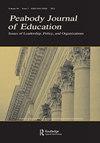Crisis Upon Crisis: Refugee Education Responses Amid COVID-19
Q2 Social Sciences
引用次数: 2
Abstract
ABSTRACT This study applies a critical political economy approach to understand the tensions, contradictions, and inequities that emerged when COVID-19 altered narratives and practices in education in emergencies, at the global policy level and within the local context of Syria refugee education in Lebanon. Through a vertical case study methodology, our research offers insights into a setting in which global organizations and actors sought to address the COVID-19 pandemic's impact on schooling, but under a significant broader context of multiple crises. Drawn from interviews conducted between October 2020 and February 2021, our data captures notions of “rupture” and “continuity,” underscoring amplifications in terms of systemic educational inequities. We focus on three key global narratives that emerged from the study, which when analyzed alongside insights from Lebanon, appear to be disconnected from how local actors experienced the pandemic. Our findings suggest that global narratives do not adequately account for the complexities of countries experiencing multiple crises, evoking questions around the capacity of international actors to understand and address multi-crisis environments in education. We discuss the implications of these findings for understanding and addressing power and equity in refugee education.危机对危机:新冠肺炎期间的难民教育对策
摘要本研究采用了一种关键的政治经济学方法,以了解新冠肺炎在全球政策层面和黎巴嫩叙利亚难民教育的地方背景下改变紧急情况下教育的叙述和实践时出现的紧张、矛盾和不平等。通过一种垂直的案例研究方法,我们的研究提供了对全球组织和行为者寻求解决新冠肺炎疫情对学校教育影响的环境的见解,但这是在多重危机的更广泛背景下进行的。根据2020年10月至2021年2月期间进行的采访,我们的数据捕捉到了“断裂”和“连续性”的概念,强调了系统性教育不平等的加剧。我们重点关注这项研究中出现的三个关键的全球叙事,当与黎巴嫩的见解一起分析时,这些叙事似乎与当地行为者如何经历疫情脱节。我们的研究结果表明,全球叙事没有充分考虑到经历多重危机的国家的复杂性,这引发了人们对国际行为者理解和解决教育中多重危机环境的能力的质疑。我们讨论了这些发现对理解和解决难民教育中的权力和公平问题的影响。
本文章由计算机程序翻译,如有差异,请以英文原文为准。
求助全文
约1分钟内获得全文
求助全文
来源期刊

Peabody Journal of Education
Social Sciences-Education
CiteScore
2.20
自引率
0.00%
发文量
43
期刊介绍:
Peabody Journal of Education (PJE) publishes quarterly symposia in the broad area of education, including but not limited to topics related to formal institutions serving students in early childhood, pre-school, primary, elementary, intermediate, secondary, post-secondary, and tertiary education. The scope of the journal includes special kinds of educational institutions, such as those providing vocational training or the schooling for students with disabilities. PJE also welcomes manuscript submissions that concentrate on informal education dynamics, those outside the immediate framework of institutions, and education matters that are important to nations outside the United States.
 求助内容:
求助内容: 应助结果提醒方式:
应助结果提醒方式:


